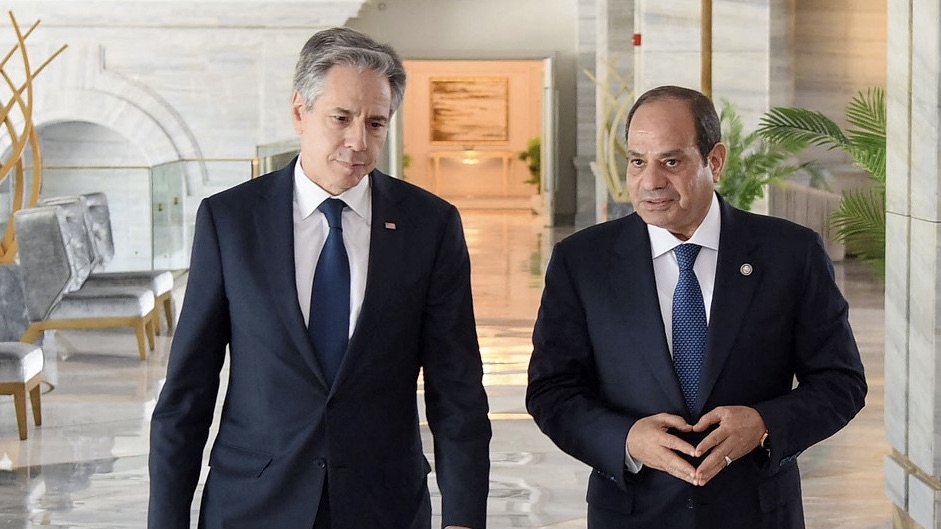How Arab autocrats enabled Israel's Gaza genocide

As Israel continues its genocidal war in Gaza, and expands it to Lebanon, most Arab countries appear to be mere observers or enablers of the massacre of Palestinian and Lebanese civilians on an unprecedented scale.
Even with the threat of a large-scale regional war looming, which could have extremely destabilising effects on the entire region, the ability and desire of Arab states to restrain Israeli imperial hubris appears to be non-existent.
There is good reason to argue that the main enabler of the current crisis engulfing the Middle East is none other than the United States, which has effectively funded the Israeli wars on Gaza and Lebanon, with aid topping $17.9bn since 7 October 2023. It has also provided diplomatic cover to Israel and given its far-right government the green light to expand the war into Lebanon.
This, however, misses an important aspect of the dynamic. Namely, Israel's colonial hubris regards having the ability to reshape the Middle East through mass violence being fed by the autocratic nature of the Arab states and the failure of the democratic movement in the region.
More than a decade after the mass revolts that swept the region, the result is weak states, with contested legitimacy, only able to exercise power over their own citizens through mass violence - not dissimilar to the way that Israel is treating the Palestinians.
New MEE newsletter: Jerusalem Dispatch
Sign up to get the latest insights and analysis on Israel-Palestine, alongside Turkey Unpacked and other MEE newsletters
In many ways, the logic of regime survival at any cost has eroded the ability of these states to influence events in the region - and, in some cases, the social foundation of the national state itself.
Flow of US aid
A notable example of this is Egypt, the most populous Arab state and the only one to have a border with the Gaza Strip, making it, theoretically, one of the Arab states with the most potential to influence the conflict and restrain Israeli aggression.
Egypt is also a close ally of the US, receiving a whopping $183.5bn in aid since the end of the Second World War, positioning it as a possible interlocutor with Israel's patron.
Follow Middle East Eye's live coverage for all the latest on the Israel-Palestine war
This strategic positioning, however, was overridden by the Sisi government's obsession with survival, which placed it in a dependent relationship with Israel, even as Israel threatens the very stability that Sisi covets.
Indeed, Israel played a not insignificant role in the consolidation of the Sisi government after the 2013 coup, offering political support, security cooperation and deeper economic ties to the direct benefit of the Egyptian elites.
For example, during the summer of 2013, after the coup that overthrew the elected president, Mohamed Morsi, the American Israel Public Affairs Committee (Aipac) was lobbying on behalf of the fledgling military autocracy to ensure the continued flow of American aid.
The close relationship between President Abdel Fattah el-Sisi and the Zionist lobbying groups continued, with reports emerging in February 2017 that Sisi met representatives of the most influential pro-Israel groups, including Aipac, Friends of the Israel Defense Forces (FIDF) and the Zionist Organization of America (Zoa) five times in 20 months.
The relationship between Sisi and Israeli Prime Minister Benjamin Netanyahu has been described as the closest between any leaders from the two nations since the peace treaty of 1979.
This apparent closeness was anchored in close security cooperation between the countries, with reports emerging in 2018 that, in the preceding two years, Israel had conducted over 100 air strikes against militants in Sinai, with Cairo's approval.
This security cooperation was extended to include direct repression of peaceful dissent in Egypt, with the sale of Israeli spyware to Sisi's government, which was used to hack into the phone of Ahmed Tantawy, a prominent member of the secular opposition.
The depth of the alliance extended to the energy sector, with a $15bn deal signed in 2018 between the two countries to import Israeli gas for re-export in liquid form.
An investigation by human rights campaigner Hossam Bahgat revealed that the Egyptian private company responsible for the deal was managed by Egypt's General Intelligence Services (GIS), allowing the country's security elites to profit from the deal directly.
Egypt's debt crisis
These deep structural dependencies placed Sisi's government in an extremely vulnerable position, unable to restrain Israel, even when the idea of the ethnic cleansing of Gaza was floated by Netanyahu, with its highly destabilising effects on the government and the country.
Indeed, beyond rhetorical condemnation, Egypt has done little to impact the dynamic on the ground. The most notable example of a critical public stance was the Egyptian declaration in May that it would join the International Court of Justice case against Israel.
At the time of writing, there is no evidence of it doing so. But there is evidence of deepening economic ties, with Egypt in September signing another deal with Israel, to increase its imports of natural gas by 20 percent.
More than a decade after the coup, with the Sisi government facing a grinding debt crisis and following a logic of power consolidation at any cost, it finds itself at the mercy of Israel and its colonial hubris, unable to exert influence on one of its closest allies.
Syria in shambles
The enabling of Israel's colonial ambitions is not limited to Israel's Arab allies, but also extends to Syria, where the logic of government survival above all else is at its most extreme.
More than a decade after the start of the Syrian uprising, the Assad government has survived, albeit at the cost of hundreds of thousands of lives, high levels of foreign interference and the loss of large swathes of territory. The Syrian economy is decimated, the state's monopoly on violence is now completely eroded, and the social foundations of the state have been eviscerated.
The post-colonial state has failed to meet its raison d'etre, namely to empower the people of the Middle East, and confront the old imperial powers, including Israel
The Syrian government has reduced the country to a narco state, blackmailing the Gulf states into reintegrating it into the Arab fold in exchange for stopping the flow of illicit drugs.
In essence, Assad decided to sacrifice the Syrian state on the altar of his survival, leaving behind a state in shambles - unable to assert control within its own borders, let alone restrain Israeli aggression that could spiral to engulf Syria as well, whose territory it already occupies.
The horrors that we are witnessing in Gaza and Lebanon are as much the result of an Israeli colonist mania, and western support for it, as it is also a direct result of the nature of the Arab political landscape that emerged from the failed Arab spring.
The post-colonial state has failed to meet its raison d'etre, namely to empower the people of the Middle East, and confront the old imperial powers, including Israel. Any pretences of this have now completely disappeared, with a new raison d'etre emerging, namely the domination of their own citizens at any cost.
This is not to argue that these states were not repressive before, but there is not now even a pretence of confronting a dangerous external enemy, now that said enemy is internal.
The dissident has now come to replace colonists and the occupier as the number one enemy of the Arab states, with the mass slaughter of the Palestinians, Lebanese and whoever dares to challenge the Israeli vision of the new Middle East standing as a testament to a new Arab autocratic political order.
The views expressed in this article belong to the author and do not necessarily reflect the editorial policy of Middle East Eye.
Middle East Eye delivers independent and unrivalled coverage and analysis of the Middle East, North Africa and beyond. To learn more about republishing this content and the associated fees, please fill out this form. More about MEE can be found here.






